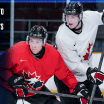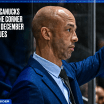Prior to their lengthy five-game road trip, the Vancouver Canucks played the St. Louis Blues at Rogers Arena. The game was a quintessential Canucks home performance. They were outshot. They were out chanced. They got terrific goaltending. They were opportunistic. Most importantly, they won the game. Add a Bo Horvat empty netter and you've got the Canucks recipe for success at home.
Home Cooking: a recipe for continued success?
...a look at how the Canucks have faired at Rogers Arena of late

By
Nate Lewis @natelewis14 / Freelance writer
Thatcher Demko, the first star of the evening, fresh off his fifth win in six appearances and one of the best performances of his NHL career, gushed about the support from Canucks fans: "(The fans) have been great. They've been super supportive all year. I know that our guys love playing for them. Love playing at home. This is our home. The fans have been proving that, the city has been proving that. It's a lot of fun for us."
Running counter to some underlying metrics the Canucks won on home-ice for the ninth time in a row; the 12th win in their last 14 home games, dating back to December 3rd. Over this streak the Canucks have averaged a Corsi For of 44.98% at 5v5, but once these numbers were adjusted for game situation I found that the Canucks have been leading for 41% of their game time at home, which provides added context as to why their CF% is considerably lower than league average. However, the script flips when the Canucks leave Vancouver. While their 5v5 CF% of 48.93% on the road is far better than the comparable non-adjusted rate at home, adjusting again for game situation on the road finds that the Canucks only led for 25% of those games. While Vancouver's CF% has been better on the road than at home, this alone is not a good predictor of success without the context that they have trailed for a whopping 44% of game time played on the road compared to just 21% of the time at home.
Nonetheless, the Canucks have earned 24 of a possible 28 points at home over their winning streak, and have collected an average of 1.48 points per home game this season, which is the 5th highest rate in the league. On the road, their average points collected (APC) plummets to 0.93, which is worse than the road APC for the four Pacific Division teams who the Canucks are battling for playoff spots and positioning. League-wide, the split between Vancouver's home and away APC (0.55) is the largest of any team currently in a playoff position. This would suggest that the Canucks' playoff hopes, and potential playoff success, hinges on winning games at home and getting to or slightly above an APC of 1 on the road, with an eye to capturing 1 of the top 2 spots in the division and home-ice advantage in a first round playoff matchup.
Many analytically oriented folks would look at the underlying numbers of the Canucks home and away performances and come to the conclusion that the biggest driver of Vancouver's home success and road struggles has been luck. And this is a compelling argument. The favoured statistical proxy for team (or player) luckiness is PDO, which adds, in this case, a team's 5v5 save percentage to their even-strength shooting percentage, for a total that averages out to 100 or 1.000. Any result above 100 is a candidate for regression, likely driven by unpredictable factors such as puck luck, a hot goalie, or a streaky shooter. Similarly, any total below 100 should rise given a larger sample size. On home ice the Canucks have the highest PDO in the league at 103.3. Away from Rogers Arena their PDO ranks 25th at 0.98. This high 'luck factor' at home coupled with a lack of puck possession in the same games would suggest that Vancouver's phenomenal run of form at home is not sustainable. However, there are a few mitigating off-ice factors that may continue to be durable positive influences on the Canucks' home performance.
When asked about the divergence between home and away success Travis Green said that road results were something he has talked with the team about and emphasized that, "to win long-term in the league you've got to be able to win on the road. We want a team that plays well at home, everyone wants to have a good home record, but you need to win on the road". Green continued to say that he thinks part of the difference might be age-related. Given that the Canucks' two best players are under the age of 22, with Elias Pettersson in his second NHL season and Quinn Hughes in his first, comments on age from the coach are bound to focus attention on the two All-Stars.
In talking about going on road trips as a young player, Bo Horvat acknowledged that there is a learning curve in managing your own rest and preparation, and that "it's totally different when you're going back to the hotel and preparing for a game … you have to learn to work both ends of it." The ongoing off-ice maturation of two young players doesn't fully account for the radical difference in home and away results. However, given how critical Pettersson and Hughes are to the team's on-ice performance, the idea that both players are still learning to navigate a professional travel schedule in one of the more far-flung NHL cities could certainly be a factor in the Canucks' struggles on the road.
For some of the veterans on the team, being in Vancouver means recharging with family and friends. Speaking with J.T. Miller and Jay Beagle, two players who spent time playing in the Eastern Conference, both players brought up the extended length of Canuck road trips. Beagle said, "I felt like last year it was easier on the family because they knew that I'd be gone for 10 days and then you're back on a home stretch for usually like 10 days". Miller added, "there's nothing like these road trips here, there's a lot of 10-dayers instead of 4-, 5-, 6-dayers", and that "by the time the road trip is over we're just dying to come home and spend time with our families".
While it's important for the Canucks' young stars to learn to manage the off-ice challenges of numerous road trips over a season, for veterans like Beagle, Miller, and Horvat, spending a chunk of time with their loved one's can be rejuvenating. Winning in front of an enthusiastic crowd may be another reason for a young team to look forward to playing home games. And when it comes down to getting results, a little bit of luck can be just what a team like that needs.
Stats by Natural Stat Trick


















